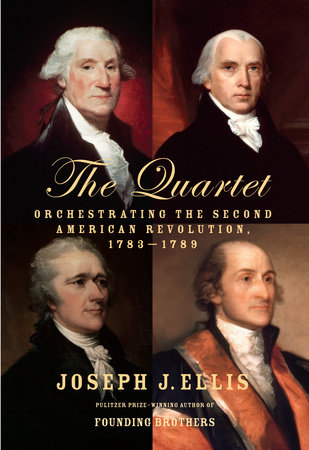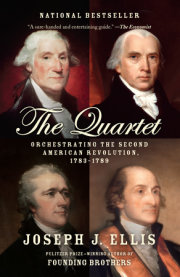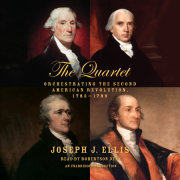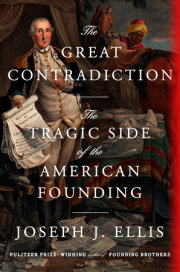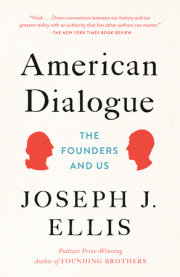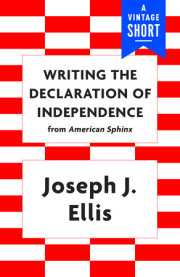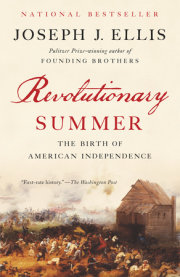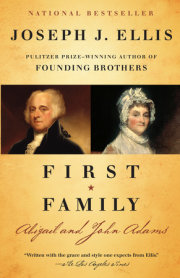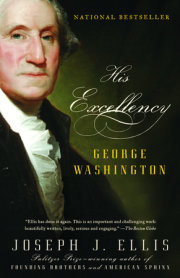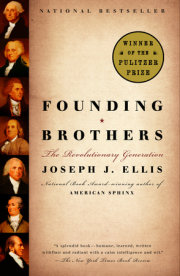Preface: Pluribus to Unum The idea for this book first came to me while listening to twenty-eight middle school boys recite the Gettysburg Address from memory in front of their classmates and proud parents. My son Scott was teaching science at the Greenwood School in Putney, Vermont, and had invited me to judge the annual oratorical contest. I don’t remember exactly when it happened, but at some point during the strenuous if repetitious effort to get Lincoln’s words right, it dawned on me that the first clause in the first sentence of Lincoln’s famous speech was historically incorrect.
Lincoln began as follows: “Four score and seven years ago our fathers brought forth on this Continent a new Nation.” No, not really. In 1776 thirteen American colonies declared themselves independent states that came together temporarily to win the war, then would go their separate ways. The government they created in 1781, called the Articles of Confederation, was not really much of a government at all and was never intended to be. It was, instead, what one historian has called a “Peace Pact” among sovereign states that regarded themselves as mini-nations of their own, that came together voluntarily for mutual security in a domestic version of a League of Nations.
And once you started thinking along these lines, there were reasons as self-evident as Jefferson’s famous truths why no such thing as a coherent American nation could possibly have emerged after independence was won. Politically, a state-based framework followed naturally from the arguments that the colonies had been hurling at the British ministry for over a decade, which denied Parliament’s right to tax them because that authority resided within the respective colonial legislatures, which represented their constituents in a more direct and proximate fashion than those distant members of Parliament could ever do. The resolution declaring independence, approved on July 2, 1776, clearly states that the former colonies were leaving the British Empire not as a single collective but rather as “Free and Independent States.”
Distance also made a huge difference. The vast majority of Americans were born, lived out their lives, and died within a thirty-mile geographic radius. It took three weeks for a letter to get from Boston to Philadelphia. Political horizons and allegiances, therefore, were limited—obviously no such things as radios, cell phones, or the Internet existed to solve the distance problem—so the ideal political unit was the town or county government, where representatives could be trusted to defend your interests because they shared them as your neighbors.
Indeed, it was presumed that any faraway national government would represent a domestic version of Parliament, too removed from the interests and experiences of the American citizenry to be trusted. And distrusting such distant sources of political power had become a core ideological impulse of the movement for independence, often assuming quasi-paranoid hostility toward any projection of power from London and Whitehall, which was described as inherently arbitrary, imperious, and corrupt. And so creating a national government was the last thing on the minds of American revolutionaries, since such a distant source of political power embodied all the tyrannical tendencies that patriotic Americans believed they were rebelling against.
In 1863 Lincoln had some compelling reasons for bending the arc of American history in a national direction, since he was then waging a civil war on behalf of a union that he claimed predated the existence of the states. This was a fundamental distortion of how history happened, though we may wish to forgive Lincoln, since it was the only way for him to claim the political authority to end slavery.
Truth be known, nationhood was never a goal of the war for independence, and all the political institutions necessary for a viable American nation-state were thoroughly stigmatized in the most heartfelt convictions of revolutionary ideology. The only thing holding the American colonies together until 1776 was their membership in the British Empire. The only thing holding them together after 1776 was their common resolve to leave that empire. Once the war was won, that cord was cut, and the states began to float into their own at best regional orbits. Any historically informed prophet who was straddling that postwar moment could have safely predicted that North America was destined to become a western version of Europe, a constellation of rival political camps and countries, all jockeying for primacy. That, at least, was the clear direction in which American history was headed.
To say that “something happened” to change that direction is obviously inadequate. The beauty of the Lincoln version of the story is its presumption that a national ethos was already embedded in the political equation, albeit latently or implicitly, so that what we might call the second revolution of 1787–88 followed naturally from the first in 1776. But for all the political, ideological, and demographic reasons already noted, the transition from the Declaration of Independence to the Constitution cannot be described as natural. Quite the contrary, it represented a dramatic change in direction and in scale, in effect from a confederation of sovereign states to a nation-size republic, indeed the largest republic ever established.
So how do we explain such a seismic shift in the gravitational field of American political history? Well, the kind of bottom‑up explanation that works so well to convey popular opposition to British imperial policy in the 1760s and 1770s will not work in the 1780s. Mobs did not appear, urging the creation of a fully empowered American nation. Quite the opposite: the dominant historical forces in the 1780s were centrifugal rather than centripetal, meaning that the vast majority of citizens had no interest in American nationhood; indeed, they regarded the very idea of a national government as irrelevant to their local lives and ominously reminiscent of the British leviathan they had recently vanquished. There was no popular insurgency for a national government because such a thing was not popular.
The obvious alternative explanation is top-down. All democratic cultures find such explanations offensive because they violate the hallowed conviction that, at least in the long run, popular majorities can best decide the direction that history should take. However true that conviction might be over the full span of American history—and the claim is contestable—it does not work for the 1780s, which just might be the most conspicuous and consequential example of the way in which a small group of prominent leaders, in disregard of popular opinion, carried the American story in a new direction.
There is an ironic precedent for this argument. During the first half of the twentieth century Charles Beard and his disciples, chiefly Merrill Jensen, created a school of thought, called the Progressive School, that dominated our understanding of the revolutionary era. While much of their work has not aged well, chiefly its claim that the founders were driven primarily by economic motives, two features of their story line remain abidingly relevant: first, that the founders must not be regarded as demigods with unique access to supernatural wisdom; and second, that the transition from the Articles of Confederation to the Constitution was orchestrated by a political elite that collaborated—to say “conspired” seems sinister, but it is what the Progressives meant—to replace a state-based confederation with a federal government that claimed to speak for the American people as a collective whole.
In virtually every other respect, the narrative offered in the pages that follow veers in a different direction from the Progressive interpretation. My sense is that the most prominent leaders of this founding elite were driven by motives that were more political than economic, chiefly the desire to expand the meaning of the American Revolution so that it could function on a larger, indeed national, scale. The great conflict, as I see it, was not between “aristocracy” and “democracy,” whatever those elusive categories might mean, but rather between “nationalists” and “confederationists,” which is shorthand for those who believed that the principles of the American Revolution could flourish in a much larger political theater and those who did not. Finally, my version of the story regards the successful collaboration of this small cadre not as a betrayal of the core convictions of the American Revolution, but rather as a quite brilliant rescue.
My argument is that four men made the transition from confederation to nation happen. They are George Washington, Alexander Hamilton, John Jay, and James Madison. If they are the stars of the story, the supporting cast consists of Robert Morris, Gouverneur Morris (no relation), and Thomas Jefferson. Readers can and should decide for themselves, but my contention is that this political quartet diagnosed the systemic dysfunctions under the Articles, manipulated the political process to force a calling of the Constitutional Convention, collaborated to set the agenda in Philadelphia, attempted somewhat successfully to orchestrate the debates in the state ratifying conventions, then drafted the Bill of Rights as an insurance policy to ensure state compliance with the constitutional settlement. If I am right, this was arguably the most creative and consequential act of political leadership in American history.
It made a huge difference that all four of the political collaborators identified here possessed impeccable revolutionary credentials. (The posture of Progressive historians has always seemed somewhat odd on this score, since the men they accused of hijacking the American Revolution were all central players in making the victory over Great Britain happen.) If the overarching issue at stake was what direction the American Revolution should take after independence was won, no one could accuse them of failing to grasp the almost mystical meaning of “The Cause.” And since Washington was the one-man embodiment of all the semi-sacred reverberations that term conveyed, his endorsement of the national agenda provided a crucial veneer of legitimacy for their bold and slightly illegal project. It also helped that all four of them had served in the Continental Army or the Continental (then Confederation) Congress, which meant that they had experienced the war for independence from a higher perch than most of their contemporaries. They were accustomed, as Hamilton put it, to “think continentally” at a time when the allegiances and perspectives of most Americans were confined within local and state borders. Indeed, the very term
American Revolution implies a national ethos that in fact did not exist in the population at large.
Perhaps the best way to understand the term
American Revolution is to realize that it describes a two-tiered political process. The first American Revolution achieved independence. It was a mere, or perhaps not so mere, colonial rebellion. It also created a series of mini-republics in the former colonies, now states, but it did so in ways that were inherently incompatible with any national political agenda.
The second American Revolution modified the republican framework existent in the states in order to create a nation-size republic. The overly succinct way to put it is that the American Revolution did not become a full-fledged revolution until it became more expansively American. Or even more succinctly, the first phase of the American Revolution was about the rejection of political power; the second phase was about controlling it. More practically, the United States could not become the dominant model for the liberal state in the modern world until the second American Revolution of 1787–88.
Copyright © 2015 by Joseph J. Ellis. All rights reserved. No part of this excerpt may be reproduced or reprinted without permission in writing from the publisher.

